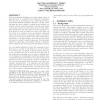Free Online Productivity Tools
i2Speak
i2Symbol
i2OCR
iTex2Img
iWeb2Print
iWeb2Shot
i2Type
iPdf2Split
iPdf2Merge
i2Bopomofo
i2Arabic
i2Style
i2Image
i2PDF
iLatex2Rtf
Sci2ools
207
click to vote
GIS
2009
ACM
2009
ACM
Efficient and Secure Distribution of Massive Geo-Spatial Data
Modern geographic databases can contain a large volume of data that need to be distributed to subscribed customers. The data can be modeled as a cube, where typical dimensions include latitude, longitude, and time. One way of distributing the data consists of making freely available encrypted versions of selected subsets of the data, and giving each paying customer the decryption keys for their authorized subsets only. The total space for these encrypted versions should be close to linear in the size of the data, yet the subset for a customer can be an arbitrary orthogonal range of the data; there is a quadratic number of such subsets, and we do not know ahead of time which subset will be subscribed (so the almost linear, and a priori selected subsets, must be enough to exactly express any of the quadratic number of ranges that could possibly interest a customer). This is mainly a data structuring and algorithmic problem. For a geo-spatial database in which the geography is modeled as...
Related Content
| Added | 09 Nov 2009 |
| Updated | 09 Nov 2009 |
| Type | Conference |
| Year | 2009 |
| Where | GIS |
| Authors | Hao Yuan, Mikhail J. Atallah |
Comments (0)

